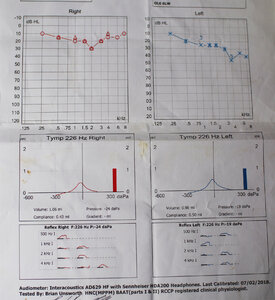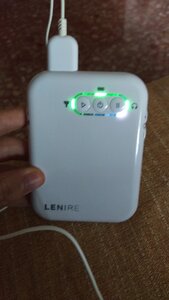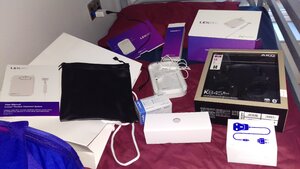Redknight/Andrew - Blog #1 (Assessment)
16/07/2019 - Neuromod Medical, Old Lucan Road, Dublin.
This will be my first blog post, I plan to do so something similar at each notable stage of the journey. All my comments are mine alone, I have no affiliation with Neuromod; some are facts, some are speculation (I'll denote any speculation for clarity).
Some quick context; I've had very mild fleeting tinnitus as long as I can remember, but it would always go away after a few hours. In February and March 2019 I developed a feeling of pressure in my sinuses and headaches that lasted a few weeks. When the symptoms went away (10th March 2019) I had more permanent tinnitus that is still there today. I also experienced a loud screech whilst on the London underground on the 5th March, this is notable because I remember my ears hurt afterward, probably not a good sign.
I will try and go through my experience at Neuromod, but not go over things that have already been discussed at length in the Tinnitus Talk Q&A and in this forum thread, unless relevant.
I will not mention Neuromod staff names or personal details, or details of other patients that I met at any of my appointments unless they want to share their details themselves. No one asked me to keep any of this private, I just don't feel it's appropriate or relevant.
------
I arrived at Neuromod around 15:00 for a 15:45 appointment and they saw me early I think. There's a window and a Nest Doorbell, with a sign that says to press here and someone will be with you soon. The person on the front desk gave me an iPad with a quick questionnaire to complete; pretty much the same as the one you complete when applying online, but with a digital signature field to sign.
I was then introduced to the clinical director/audiologist who would perform some tests and evaluate me for the device.
I was asked about my tinnitus and my hearing, how I cope with it and how I felt generally. I explained that my tinnitus varies wildly throughout the day, from a barely audible hiss (2 out of 10) to a louder 'eeeeeeeee', which sometimes developed a noise to it 'SSSHHHHEEEEEEE' (4 out of 10). I already know I have very mild loss around 4 kHz from a previous audiogram, which I was asked to bring with me to give a baseline for discussion. I was asked about whether I'd used hearing aids before, but given my very mild loss, there was no indication that they would benefit my tinnitus.
I was asked about my mood and whether I'd ever been diagnosed clinically with depression or any other psychiatric disorders. I have not been, so the questions ended there. SPECULATION - I believe I would have been probed much more in this area if I did suffer from proper depression or other psychiatric issues which may lead to not being recommended for the device.
The audiologist then looked inside my ears and confirmed that I had a tiny amount of wax in my right ear, nothing to be concerned about. SPECULATION - I believe if I had significant wax build-up (enough to cause hearing loss), I would have been told to get that sorted and come back another day. The audiologist was probably looking for eardrum issues, like the line of light they see, etc, but there was no comment made about mine.
I was then asked to sit in the soundproof booth and I did the normal 'push the button when you hear a sound' test. They made it clear that it was the quiet sounds that mattered the most and indeed, this was by far the quietest hearing test I've ever had, it was almost entirely made up of sounds I could barely hear (again, I have only very mild loss, almost not worth mentioning). It is worth noting though, that the audiologist had a copy of a very recent, professional audiogram done in Belfast. They may have assumed good hearing at louder levels and not needed to test those. I was not given a copy of this audiogram and did not ask for a copy. I did not do the 'can you hear these spoken words over other noises' test that I've done before.
I did, however, do a tinnitus masking test. This was really hard for me, my tinnitus tends to increase in volume as I introduce noise. As I sat there in a quiet booth, the tinnitus was barely a low hiss, but as the white noise was introduced my tinnitus ramped up, or at least my perception of it. I had a stab at telling where it was masked but wasn't 100% sure. I was asked to go again, with louder noise and again a third time, each with louder white noise. By the third, I was pretty sure it was masked (I'll talk a little about exclusion criteria later).
Once out of the booth the audiologist confirmed that I would be recommended for the device and we had a chat to talk more freely about Neuromod, Lenire and as many of the questions I've read on here that I could remember, without being rude (spoiler - I was tired and could only remember a few). I'll just list these as they come to me;
Q. What would exclude someone from Lenire and have you excluded many people?
A. Obviously, the contra indicators which are mentioned when you complete the online form are crucial, any of those could exclude you based on medical/safety grounds.
Non-acceptance of the realistic chances of benefitting from Lenire (we have all seen the results from the trials by now), if someone believes, and cannot be dissuaded from a notion that Lenire is going to cure or definitely reduce their tinnitus, then they would not be recommended the device. That's not to say that you would be refused if you just had the wrong idea about it. If someone walked in because their friend got silence and they had to have it explained to them, but they then accepted the realistic chances of that, they would still be eligible. Neuromod doesn't want unhappy customers, if you are essentially saying that you will not be happy with anything less than silence or x% reduction, you will be unhappy.
Obvious things that could reduce your tinnitus, that haven't been tried yet might mean coming back at a later date. Not to say you are refused, but rather, go away and try something and come back in x weeks. Examples of this were people with hearing loss that had never tried hearing aids or didn't wear them enough. Also, if you had a significant build-up of wax that would impair hearing, you would be asked to sort that first and come back. We didn't discuss any more examples, but if you present with something obvious to try first, they will ask you to do that. SPECULATION - there was no discussion of supplements during my visit, I don't believe supplements would be something they would consider 'an obvious thing to try', but if you had a medical need for medications, that might fall into this category.
Hearing loss. This is discussed more accurately elsewhere, but you need enough hearing to hear the sounds. If in doubt, send an audiogram to Neuromod before traveling.
Psychiatric issues. This was a big one an not easily answered. We did discuss this in-depth, and I know that some of you will be annoyed by this comment. I believe exclusion criteria are there for a reason and our conversation was had after my assessment and it would be unfair on everyone to outline what to say or not say to avoid exclusion. All I will say is to answer the questions honestly, for everyone involved's best interests.
Yes, many people have been excluded, no numbers were given though.
Q. What about the exclusion criteria in the clinical trials and some of the other things I've read on Tinnitus Talk? Here I was specifically querying whether age, tonality, length of time with tinnitus or cause of tinnitus was a factor.
A. Not in the selection/exclusion criteria. The clinical trial needed defined parameters and people of a similar cohort. The only exclusion criteria that we see in this area is that you have to have had tinnitus for more than 3 months. SPECULATION - To be categorised as having chronic tinnitus.
Tonality, cause of tinnitus, somatic or non-somatic, one ear or both don't matter.
Loudness does matter, as your tinnitus must be able to be masked at an acceptable volume of white noise. The acceptable level was not defined in dB, but the audiologist is looking to ensure you can listen to the sounds at an appropriate volume and that you don't need sound blaring in your ear for an hour to mask it.
All that said, there may be data in the future that suggests that specific forms of tinnitus may be better or worse affected by Lenire, they just don't know yet.
Q. What are your thoughts on people traveling from across the globe to get Lenire?
A. (Controversially) Whilst we can't legally stop people coming, they are doing so at their risk and take up an appointment slot for someone else. The thinking here is that, despite what many say, a large number of people just don't come back after their first appointments when they have traveled from far afield. MY THOUGHTS - being faced with an actual device, financial bill and the stark realities of how likely you are going to get silence or a significant reduction, many just decide to stop or wait a while before continuing. I had those feelings myself, I was convinced I was doing it until I got there, and I had a wobble when presented with the information in the clinic. It's nothing I don't already know, but don't assume you will be in the 80% who get a benefit, be prepared to be in the 20% and overjoyed if you're in the 80%.
Q. To the device fitter, not the audiologist, because I forgot earlier. Has anyone had Lenire permanently increase their tinnitus during the trials?
A. No, not permanently. Many people experience changes in their tinnitus during the treatment and for a time afterward. Of those that had an increase in their tinnitus, all resolved shortly afterward and returned to baseline or continued to reduce. Some chose to leave the trial as a result of changes, they were tracked and returned to baseline. Neuromod cannot 100% guarantee that you will not get an increase in your tinnitus because of or during treatment, even permanently. All they can do is tell you what they saw in the trial data. MY THOUGHTS - EEK! That sounds scary.
Q. Is the device effective beyond 12 weeks?
A. To be clear, the trial length was 12 weeks, simply because it had to have a start and an end. Some people starting seeing benefit a few weeks in, some months, some never. We don't know what would happen if you used it for three, six or 12 months and you should absolutely continue to use it until you see fit to stop. If you need follow up appointments, those can be arranged at a charge, but you are by no means left without assistance, should you need it.
In theory, a person could see results when using the device and need to use it every day to maintain those results permanently, we just don't know.
Q. Have you had many trial members return to buy the device?
A. Yes, many. Quite a few were seeing progressing results but returned to baseline after the trial ended and wished they could have continued using it. SPECULATION - I think if people who were mild responders in the trial could use it for six to twelve months they would see better results.
That's all I can think of at the moment, it was a bit of a blur, to be honest.
--------
I was then taken through to the device fitter.
The device was demonstrated to me, although as a demo model, it didn't light up or produce the electrical tongue stimulation. Other than the obvious buttons on it, there were a few notable things;
The device is set to a particular volume and tongue tip intensity, based on your assessment. They adjust this as necessary throughout each review appointment. Yes, they ask you the same questions and put you through the same tests to do this. Interestingly (to me anyway), you can adjust the volume up or down in case you are using the device in a quieter or louder than normal environment, there is no clinical benefit to this, other than you need to be able to hear the sounds and you don't want to cause discomfort to those with hyperacusis. You can adjust the tongue tip intensity depending on your preference, but again, this has no effect on clinical benefit, it's just for comfort (down to reduce the tingle or soreness, and up to know it's doing something).
The tongue tip has numerous metal connections on it. If they lose connection with your tongue for 30 seconds, the device will pause the sound and wait for you to reconnect.
You can pause the device for a maximum of 5 minutes, to take a call or something, but no longer or you will need to restart the treatment.
They suggest you do nothing during the treatment, just zone out. Some read whilst doing it, but you should refrain from watching TV (subtitles), posting online, playing games, etc. SPECULATION - They inferred that it might be beneficial to even not read during the treatment i.e the less you do the better. That said, sleeping is not allowed and you should sit straight up to reduce the chances of the tongue tip slipping out and you nodding off.
You should split the treatment into two, thirty-minute sessions per day. It doesn't matter when you do the treatment but aim to do them at the same time each day. I suggested once in the morning before going to work and once in the evening when the kids are in bed and she agreed. I believe you could do it for a single sixty-minute session, but that seemed to be less preferred than two, thirty-minute ones.
The device/treatment/contract has a 3-year life/warranty.
Only people from the Republic of Ireland can choose option 3 on the pricing sheet.
You cannot share the device. You cannot privately sell the device without written permission from Neuromod. You cannot resell the device. It's all in the attached terms and conditions.
You do keep the device after.
That's about all I remember, for now, I had a lovely coffee with a Tinnitus Talk member afterward and drove home after paying for my car-parking

My return dates are as follows;
02.08.19 - Device Fitting - 4 weeks is a guideline, purely based on timetable availability, there is no legal, financial or medical reason for the 4 weeks. I got a free spot in the diary.
20.09.19 - Review 1
01.11.19 - Review 2

 Member
Member
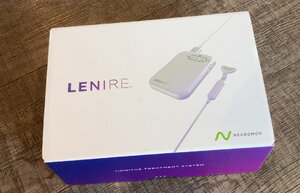
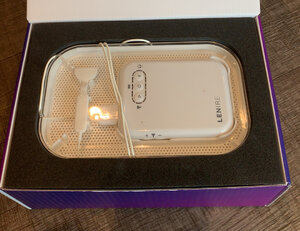
 Director
Director
